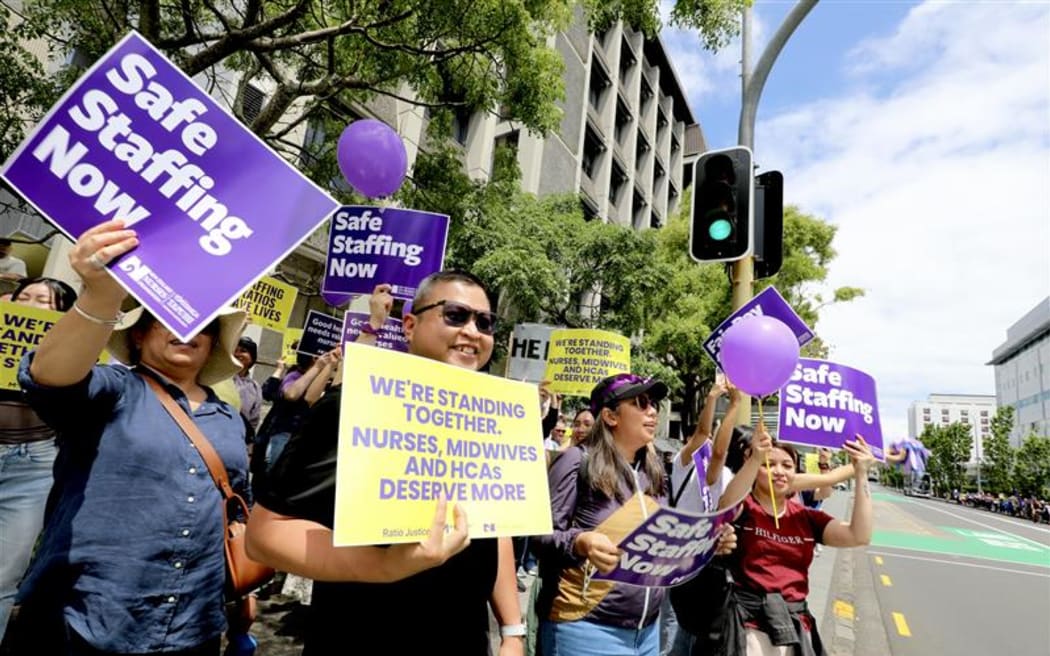
Auckland nurses took strike action in December over pay and staffing. Photo: RNZ / Marika Khabazi
A West Auckland district nurse who fractured her ankle at work had to finish her shift because there was nobody to cover for her.
A group of about 16 Waitākere district nurses have written to the CEO of Health New Zealand (HNZ) - asking the agency to urgently fix the severe short-staffing on their team, which they say has put "unacceptable strain" on staff and patients.
Some nurses said they have had to delay their own health procedures due to the difficulty of getting leave.
District nurses provide specialised care - such as wound care and palliative care - at people's homes or in a clinic, and there are currently 20 full-time-equivalent (FTE) staff on the Waitākere district nursing team, HNZ confirmed.
The letter said the team is routinely operating with two to three fewer registered nurses than required, and FTE allocation has not kept up with the pace of West Auckland's growing population and the increasing patient complexity.
The nurses also raised concern that vacancies having to be approved by higher management is slowing down recruitment - to which HNZ had no comment, when asked about the criticism.
Have you been affected? Share your stories with us at iwitness@rnz.co.nz
On the day RNZ spoke to Waitākere district nurse Rose Maber, she said they had six nurses on the road and over 80 patients that needed to be seen in the community.
Maber, speaking in her capacity as a NZ Nurses Organisation union delegate, said that was half the number of nurses needed for safe staffing, and barely enough time for driving between locations, providing care and finishing paperwork.
"People are at breaking point ... we're here because we're passionate about what we do in providing quality of care, and we just don't have the time to do it," she said.
"The more complex assessments are needing to be put off, they're often scheduled but then come the day, and the lack of staff [means] we're unable to do them, so that can delay healing time," she added.
Nurses were concerned about the impact on patients, such as compromised wound care, and patients who were waiting longer for catheter changes and were at a higher risk of getting infections.
Maber said it felt like the number of district nurses roles allocated to her area had not increased over the past 10 years, and she wanted to see a review of the service which took into account the increase in the number of referrals.
She said often the afternoon clinics would get cancelled due to short staffing.
Another Waitākere district nurse, who did not want to be named, said when she fractured her ankle on the job, she continued to work until the end of her clinic shift due to the lack of cover.
"Sat down for most of my duty, and used my other foot that I could use to push me across the room to get dressings off the shelf, and back to the laptop to have a look and write my notes, and skated on the chair to the door to call the next patient in, it was a very long duty, because of the pain," she said.
The nurse said she stayed to work because she did not want to let the team down.
Like her, Maber also delayed much needed hip reconstruction surgery, saying that work demands were the main factor.
"You feel like you can't have six weeks off work, because you just feel like you're gonna make it harder for your colleagues, and that's definitely been a deciding factor for me as to why I've put it off and put it off," she said.
Others on the team have also raised the challenges of getting leave - a nurse said in her statement in the letter that she needed to take two weeks off for elective surgery but was told that it would be "difficult".
HNZ group director of operations for Waitematā Brad Healey said in a statement the agency did not have a record of staff being injured at work and not being able to access appropriate treatment due to workloads.
"This would certainly not be an approach we would expect of our staff," said Healey.
Healey said annual leave is proactively managed, and there was a limit on how many staff could be on leave at the same time.
He said he was aware that district nursing teams in Waitematā were stretched due to recent resignations and an increase in the complexity of the patients.
Healey said HNZ was recruiting for the vacant roles and three nurses have accepted offers and will be joining the Waitākere team over the next two months.
However the nurse who did not want to be named said she was not convinced that would solve the problem.
"In two months, a lot of us will have burned out, and in two months, there would possibly be more resignations," she said.
The nurse said she was "heartbroken" by the work conditions.
She said a recent medical appointment she attended as a patient was "confronting" for her, as she compared herself to the caring nurses who cared for her.
"The people that I was dealt with were just wonderful in caring and compassionate, and I just looked at them and I felt I had none of this left ... and that, as a result of how we are pushed to get as many people through as we can," she said.
Sign up for Ngā Pitopito Kōrero, a daily newsletter curated by our editors and delivered straight to your inbox every weekday.





